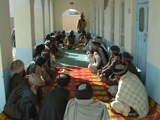Making More Out of Less: How NATO States Can Seize the Opportunities of Shrinking Resources in Afghanistan
24 Jul 2012
By Michael F Harsch, Scott Smith for ISN
It is on the surface bizarre that an alliance dedicated to security in the North Atlantic should find its fate bound to a conflict in South Asia. Yet on 8 July 2012, when over fifty nations and numerous international organizations convened in Tokyo for a major conference on Afghanistan’s future, the inextricable links between Western and Asian security were made more evident than ever. NATO countries and most non-Western states agreed that another period of conflict over national authority in Afghanistan’s oft-contested terrain would make it an even more fertile breeding ground for extremism and destabilize a region that is becoming increasingly important for the global economy and for global stability.
However, creating the foundations for durable peace will have to be achieved with far fewer resources after NATO forces withdraw in 2014. This can, paradoxically, be an advantage: The reduction in resources creates incentives for more efficient and effective engagement in Afghanistan and the region as a whole. Yet it requires a revised transatlantic strategy for the post-2014 period which combines transatlantic resources to promote a peaceful political transition in Afghanistan and facilitate meaningful regional cooperation.
On paper, international support for Afghanistan continues to be impressive. At Tokyo, donor countries pledged $4bn in annual aid to Afghanistan for the four-year period from 2012 to 2015. At their summit in May, NATO leaders had already pledged $4.1bn in yearly military assistance for Afghanistan's security forces. Yet, it remains unclear if donor assistance will be sufficient to close Afghanistan’s fiscal gap that the external pageWorld Bank estimatescall_made will still be an unmanageable 25 percent of GDP by 2021/22. Even more worrisome is the fact that if current international spending patterns continue, most of the international money is also unlikely to make an impact on Afghanistan’s economy and security. According to the World Bank, approximately 80 percent of external security and development aid never reaches Afghanistan or flows directly out of the country through international contractors, imports, and the expatriation of profits. Aid channeled through the Afghan government is more likely to reach the domestic economy, but a lack of effective governance and widespread corruption have led to the concentration of wealth in the hands of a few.
The past ten years in Afghanistan have seen wasted resources, duplication of effort, failure to adjust to changing circumstances, and a lack of strategic vision and political imagination. The financial crisis that has engulfed the West over the past four years has exposed these weaknesses and made clear their costs. Facing deep debt crises at home, NATO countries will be reluctant to make substantial, binding commitments to assist Afghanistan in the “Transformation Decade” from 2015 to 2025.
NATO members must make a virtue out of financial and political necessity: A measured withdrawal from Afghanistan creates manifold opportunities. Economically, the reduction of resources makes threats of conditioning future assistance on governance reforms more credible. Militarily, NATO’s conditions-based security transition plan impels Afghan security forces to defend themselves. It will also dramatically reduce the cost of an increasingly alienating international military operation. Politically, the withdrawal of the excessive number of highly-paid yet frequently ineffective western advisors and consultants frees resources for allocation to new priorities. At the same time, a reduction of international aid ends the free ride that has allowed local power brokers to evade responsibility by blaming the international presence for failures while reaping its rents.
Seizing these opportunities requires a revised transatlantic strategy for the post-2014 period. First, it is necessary but insufficient to focus on averting the Afghan government’s military and financial collapse. The US and the European NATO states must devote much more attention to the external pagepolitical transition in Afghanistancall_made. This includes maintaining efforts to reach an inclusive political settlement with the Taliban (and hence with Pakistan), as well as to more effectively address the conundrum of Afghan governance. The latter will require at a minimum a peaceful transition of power through the 2014 presidential elections.
Second, the transatlantic partners should promote the creation of one comprehensive regional forum for cooperation on practical issues. Past efforts have seriously neglected the regional dimension of Afghanistan’s conflict and attempts at including Pakistan and other regional stakeholders in conflict resolution and economic reconstruction have remained half-hearted. The new forum could resemble the Conference for Security and Cooperation in Europe (CSCE), which facilitated cooperation between East and West during the Cold War. In addition to Afghanistan and Pakistan, it should include Iran, China, India, Russia and the former Soviet Republics in Afghanistan’s north. The US and the EU could be members or permanent observers. The existing calculus in the region — to count on the western alliance to either succeed or contain the effects of failure — is unsustainable. These powers now will either reap the benefits of success or pay the costs of failure; they must play a much larger role in shaping the outcome in Afghanistan.
NATO states’ ability to implement an effective common approach in allocating their shrinking resources in Afghanistan will be central to reconstructing the battered self-confidence of the transatlantic alliance. The outcome of alliance’s engagement will be crucial to the future of Afghanistan, the South Asia region, and global security.
For additional reading on this topic please see:NATO and Afghanistan: Beginning of an Orderly or a Messy Process of Withdrawal?
Tokyo Conference on Afghanistan: Japanese Leadership at a Critical Juncture
After Combat, the Perils of Partnership: NATO and Afghanistan beyond 2014

